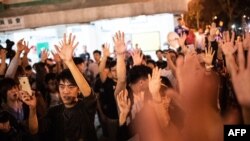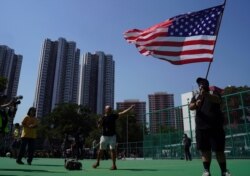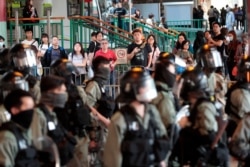“Now all I want to do is try everything possible with the goal to eventually return home. I think this is the desire for a lot of Hong Kongers in exile.”
Lee Ka-wai, a 25-year-old former district councilor in Hong Kong, left the former British colony in March to forge a new identity in London where he’s trying to figure out what to do next after a working life in journalism and community activism.
Lee became district councilor for Tuen Mun District in November 2019, when 452 seats on the local advisory body were up for grabs across Hong Kong.
The direct vote, a landslide victory for the pro-democracy opposition, came after months of demonstrations and protests by Hong Kongers who objected to China’s tightening grip.
Lee, a journalist who pivoted into pro-democracy activism during the protests, ran for the Tuen Mun seat after another candidate dropped out. Residents of the middle-class but not monied district were once fed up with mainland traders who made day trips into area to buy household items for resale in China. By the time Lee ran for office, that irritation had waned as their suspicion of Beijing grew.
Lee, with a group of other young candidates, the “10 Tuen Mun Brothers” defeated veteran pro-Beijing candidates. Responding to his constituents desire for change, Lee joined the movement to form the Hong Kong Citizens’ Deliberative Platform, a platform for cross-party cooperation and civic discussions that was hobbled in December 2020 after the Hong Kong government said the platform could violate the National Security Law imposed in June.
But Lee carried on as Tuen Mun’s district councilor. The hyper-local position addresses basic concerns of constituents such as overflowing trash bins and accessing government programs.
It’s difficult, demanding work, and Lee told VOA Cantonese that he found his job even more challenging when he learned he was being followed.
In early January, when Lee witnessed the arrests of some 50 pro-democracy politicians and activists, he knew he was in danger.
Lee felt guilty, he said, when he saw his friends being jailed.
“I know it was a real luxury that I could choose to leave,” he told VOA Cantonese.
Without resigning as Tuen Mun’s district councilor, he arrived in Britain in March 2021 and moved into a London "parent house" run by Hong Kongers willing to take in exiled dissidents for a short time. Britain has taken in thousands of Hong Kongers.
Some hold British National Overseas passports, a document available to those born before Hong Kong reverted to China in 1997; others do not.
Lee, who preferred to not disclose his immigration status, is using the parent house refuge to try figure out his next step.
“I didn’t really want to resign,” he told VOA Cantonese. “I thought I could still help my people even if I’m abroad.”
For a few months, Lee helped other Hong Kong activists self-exiled in Britain with applications for college and asylum. He found that without much work experience, setting out on a new career path when he wasn’t sure where he would be the next day seemed like an insurmountable challenge.
Another activist living in the parent house inspired Lee during dark moments.
“He started to cook and work out the first day he arrived in Britain,” Lee told VOA Cantonese. “He told me, yes there’s no way to know what will happen to Hong Kong. And yes, it’s hard to predict where my life would take me tomorrow, but if I can’t take care of myself at this very moment, then I can’t deal with any problems down the road.”
The other activist made Lee realize that most people who have had to relocate to other countries go through a period of identity crisis. And although Lee
knew he didn’t want to give up his identity as a district councilor, fulfilling his duties from afar was a struggle.
In May, the Hong Kong government helped Lee decide his future when the Legislative Council, which is dominated by pro-government lawmakers, passed an amendment requiring district councilors to swear an oath of allegiance to the government, even though they were already in office.
In response, more than 250 councilors have quit.
Lee, who was officially disqualified in July for missing several meetings, said he would not have taken the oath.
“I didn’t want to be forced to say anything I didn’t want to say,” he added.
“And I knew at that point that I had to take care of myself first, so I let go of my job as a district councilor,” Lee said. “Now, I’m just a Hong Konger in exile who’s trying to figure out my life,” he continued.







